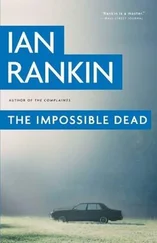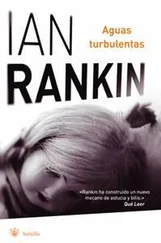‘What happened?’
‘Mother dried out, Rough went back home. Then, later on, she was diagnosed with liver disease, only nobody bothered moving Rough.’
‘Why?’
‘Because by that time, he was looking after his father.’
The Farmer looked towards his collection of family snaps. ‘The way some people live...’
‘Yes, sir,’ Rebus agreed.
‘So where’s this leading?’
‘Only this: Rough comes back to Edinburgh, apparently because we want him here. Next thing, the officer who put him away ends up walking off Salisbury Crags.’
‘You’re not suggesting a connection?’
Rebus shrugged. ‘Jim goes out to dinner at some friends’ with his wife and kid. Drives home. Goes to bed. Next morning he’s dead. I’m looking for reasons why Jim Margolies would take his own life. Thing is, I’m not finding any. And I’m also wondering who’d want Darren Rough back here and why.’
The Farmer was thoughtful. ‘You want me to talk to Social Work?’
‘They wouldn’t talk to me.’
The Farmer reached for paper and a pen. ‘Give me a name.’
‘Andy Davies is Rough’s social worker.’
The Farmer underlined the words. ‘Leave it with me, John.’
‘Yes, sir. Meantime, I’d like to take a look at Jim’s suicide.’
‘Mind if I ask why?’
‘To see if it does tie in with Rough.’ And maybe, he could have added, to satisfy his own curiosity.
The Farmer nodded. ‘On the subject of Shiellion... when do you give evidence?’
‘Tomorrow, sir.’
‘Got your spiel rehearsed?’
Rebus nodded.
‘Remember the secret of a good court appearance, John.’
‘Presentation, sir?’
The Farmer shook his head. ‘Make sure you take plenty of reading matter with you.’
That evening, on his way home, he dropped in to see his daughter. Sammy had moved out of her first-floor colony flat into a newish ground-floor flat in a brick-built block off Newhaven Road.
‘Downhill all the way to the coast,’ she’d told her father. ‘And you should see this thing with the brakes off.’
Referring to her wheelchair. Rebus had wanted to put his hand in his pocket for a motorised one, but she’d waved away the offer.
‘I’m building up my muscles,’ she’d said. ‘And besides, I won’t be in this thing for long.’
Perhaps not, but the road back to full mobility was proving hard going. She was receiving physio only twice a week, spending the rest of her time concentrating on home exercises. It was as if the accident had affected both her spine and her legs.
‘My brain tells them what to do, but they don’t always listen.’
There was a little wooden ramp at the main door to her block. A friend of a friend had constructed it for her. One of the bedrooms in the flat had been turned into a makeshift gym, a large mirror placed against one wall, and parallel bars taking up most of the available space. The doorways were narrow, but Sammy had proved adept at manoeuvring her wheelchair in and out without grazing knuckles or elbows.
When Rebus arrived, Ned Farlowe opened the door. He had a job subbing for one of the local freesheets. The hours were short, which gave him time to help Sammy with her workouts. The two men still didn’t trust one another — did fathers ever really come to trust the men who were sleeping with their daughters? — but Ned seemed to be doing his damnedest for Sammy.
‘Hi there,’ he said. ‘She’s working out. Fancy a cuppa?’
‘No thanks.’
‘I’m just making some dinner.’ Ned was already retreating to the long, narrow kitchen. Rebus knew he’d only be in the way.
‘I’ll just go and...’
‘Fine.’
The smells from the kitchen were like those in the Engine Shed: aromatic and vegetarian. Rebus walked down the hall, noting graze-marks on the walls where the wheelchair had connected. Music was coming from the spare bedroom, a disco beat. Sammy was lying on the floor in her black leotard and tights, trying to get her legs to do things. Her face was flushed with effort, hair matted to her forehead. When she saw her father, she rested her head against the floor.
‘Turn that thing off, will you?’ she said.
‘I could just watch.’
But she shook her head. She didn’t like him watching her at work. This was her fight, a private battle with her own body. Rebus switched off the tape machine.
‘Recognise it?’ she asked.
‘Chic, “Le Freak”. I went to enough bad discos in the seventies.’
‘I can’t imagine you in flares.’
‘Distress flares.’
She had pushed herself up to sitting. He made just the one step forward to help her, knowing if he got any closer she’d shoo him away.
‘How’s your claim for disability going?’
She rolled her eyes, reached a hand out for a towel, starting wiping her face. ‘I thought I knew all about bureaucracy. Thing is, I’m going to get better.’
‘Sure.’
‘So there are all kinds of complications. Plus my job at SWEEP’s still open.’
‘But the office is three floors up.’ He sat on the floor beside her.
‘I can work from home.’
‘Really?’
‘Only I don’t want to. I don’t want to become dependent on just these four walls.’
Rebus nodded. ‘If there’s anything you need...’
‘Got any disco tapes?’
He smiled. ‘I was more Rory Gallagher and John Martyn.’
‘Well, nobody’s perfect,’ she said, wrapping the towel around her neck. ‘Speaking of which, how’s Patience?’
‘She’s fine.’
‘I talk to her on the phone.’
‘Oh?’
‘She says I speak to her more than you do.’
‘I don’t think that’s true.’
‘Don’t you?’
Rebus looked at his daughter. Had she always had this edge to her? Was it something to do with the accident?
‘We get along fine,’ he said.
‘On whose terms?’
He stood up. ‘I think your dinner’s nearly ready. Want me to help you into the chair?’
‘Ned likes to do it.’
He nodded slowly.
‘You didn’t answer my question.’
‘I’m a policeman. Usually we ask the questions.’
She draped the towel over her head. ‘Is it because of me?’
‘What?’
‘Ever since...’ She looked down at her legs. ‘It’s like you blame yourself.’
‘It was an accident.’ He wasn’t looking at her.
‘It pushed the two of you back together. Do you see what I’m saying?’
‘You’re saying I’m busy blaming myself for your accident, while you’re busy blaming yourself for Patience and me.’ He glanced towards her. ‘Does that just about sum it up?’
She smiled. ‘Stay and have something to eat.’
‘Don’t you think I should head home to Patience?’
She lifted the towel from her eyes. ‘Is that where you’re going?’
‘Where else?’ He gave her a wave as he left the room.
Being down Newhaven Road, he stopped off at a couple of waterfront bars, a pint in one, nip of whisky in the other. Plenty of water in the whisky. It was dark, but he could see streetlights across the Forth in Fife. He thought of Janice and Brian Mee, who had never left their home town. He wondered how he’d have turned out if he’d stayed. He thought again of Alec Chisholm, the boy who had never been found. They’d scoured the countryside, sent men down into disused coal-shafts, dredged the river. A long hot summer, the Beatles and the Stones on the café jukebox, ice-cold bottles of Coke from the machine. Glass coffee cups topped with frothed milk. And questions about Alec, questions which showed that none of them had ever really known him, not deep down, not the way they thought they knew each other. And Alec’s parents and grandparents, walking the streets late at night, stopping to ask strangers the same thing: have you seen our boy? Until the strangers became acquaintances, and they ran out of people to stop.
Читать дальше












